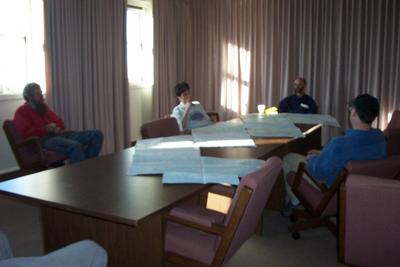19 March, 2002
Five scientists look with deep concentration at four, large
topographic maps that lay strewn across the table. It's trip
planning time... The last minute details of the trip route must be
shared with all members of the team. The route must be carefully
planned and organized. Not only for travel purposes but also to
ensure that the scientific measurements are taken at the appropriate
places. GPS (global positioning system) measurements will be used to
navigate our route. The GPS works by reading longitude and latitude
coordinates that are transmitted from satellites. These satellites
orbit the Earth and are constantly taking readings. There are
approximately 100 sites that we will take measurements at along the
route. These sites are all known by their longitude and latitude
coordinates.
The methods and techniques of taking the scientific measurements was
also discussed. Some of the instruments require careful handling for
the measurements to be recorded accurately. It is much easier to go
over the methods of taking measurements in a nice, warm room rather
than the cold Arctic air.
Plans for visits to the 6 native villages was also discussed. Last
but definitely not least, safety issues were gone over in detail! We
want to have a safe and successful expedition!!!!
The SnowStar 2002 expedition is ready for departure to Nome tomorrow
!!!. So- the next two days will be long, traveling days. We are very
anxious, and excited to begin!!!!

Plans, maps, and thoughts!
Contact the TEA in the field at
.
If you cannot connect through your browser, copy the
TEA's e-mail address in the "To:" line of
your favorite e-mail package.
|
